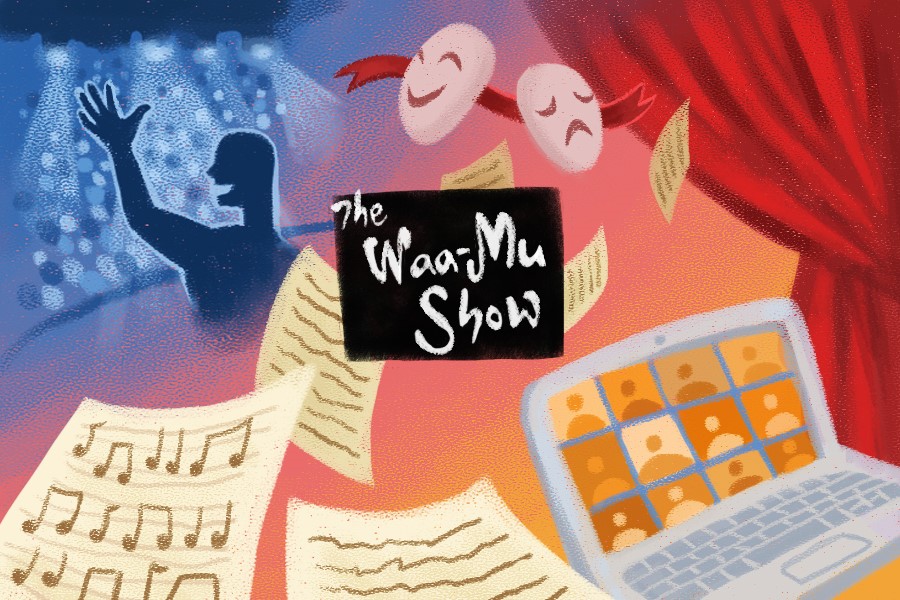The Waa-Mu Show reflects on history as it approaches 90th anniversary
Waa-Mu will be performing their 90th show as a film this year.
January 21, 2021
Switching from stage to DVD, this year’s 90th annual Waa-Mu Show, “The Secret of Camp Elliot,” will be a movie instead of a live performance.
Communication senior and co-chair Jessica Nekritz said because professionals help stage the production, the team was able to access better props, such as a globe hanging from the ceiling of Cahn Auditorium.
Nekritz said the high production value of the show and the collaborations between students and Chicago-area designers make the show really special, which is why they chose to make a film instead of another Zoom production like last year.
The Waa-Mu Show celebrates its storied past
To celebrate its 90th anniversary, The Waa-Mu Show will host a big reunion Zoom call with the alumni community.
Communication senior and co-chair Pallas Gutierrez catalogued the show through the years as last year’s historian.
“We’ve gotten to 90 years,” Gutierrez said. “It’s changed a lot. Even in my time at Northwestern, structures have changed. But still at its core, it’s a musical that students are writing. And I think that that is such a cool, unique endeavor.”
Deborah Henry (Weinberg ‘79) said she’s gone to every year’s Waa-Mu show since she was a freshman at the University.
“Every year in Chicago, they have a Christkindlmarket,” Henry said. “And that’s something I look forward to every year because I get to go eat dark chocolate covered pineapple. That’s like my annual treat. And just like the Waa-Mu show, every year it’s my annual treat.”
Henry said she loves everything about the show, from the choreography and the songs to the diversity of the cast and the show’s commentary on current events.
Henry, who lives in the South Side of Chicago, makes the journey to Evanston every year with her group of friends. One friend will drive in from Toledo, Ohio. Another that has been coming with her for 20 years to see the production.
“I’m 63. I’ll be 64 in June,” Henry said. “I get just as excited about Waa-Mu today as I was back then.”
The Waa-Mu Show works toward a more inclusive future
According to Gutierrez, the role of historian has changed to also examine The Waa-Mu Show’s contributions to the legacy of institutionalized racism.
“Looking back at that, how can we look forward to a more actively antiracist inclusive future?” Gutierrez said.
Weinberg sophomore and this year’s historian Yola Mzizi said she isn’t really involved in the theatre community and brings an “outsider” perspective. As the Waa-Mu historian, she wants to explore the perception that theater is an inclusive space.
“Everything is jolly here, at least on the outside,” Mzizi said. “But then we also have to ask ourselves, why is it such a White space? And how does that influence the stories that get to be told?”
Mzizi said she wants to talk to Black, female and queer alumni to hear about their experiences and examine how shows in Waa-Mu history reflect historical issues and attitudes in different time periods. This year’s show touches on issues of racism and sexism and is catered toward children. Mzizi said she hopes to write articles and start a short podcast to make these topics accessible to young audiences.
Despite the show’s history of addressing social justice issues, Gutierrez said the petition process to be in Waa-Mu is entrenched in standards of White professionalism.
“Waa-Mu has had certain sort of unspoken barriers for entry, like a background in musical theater, experience in musical theater writing or composition or playing piano, which are all things that, due to how class and race align in the United States, have excluded a lot of low income students,” Gutierrez said. “But that particularly excludes a lot of students of color, especially Black students.”
Mzizi also draws the issue back to the University as a whole. She said it is important to not only look at who Waa-Mu accepts in petitions, but also who Northwestern accepts into their student body in the first place.
For one, Northwestern has not always been an integrated campus.
“In the ‘60s, they would only accept five Black students a year, which then means who was cast in Waa-Mu?” Mzizi said.
Gutierrez said they would like to see different voices represented at all levels of the Waa-Mu team.
The show has since changed its petition process to focus on what ideas a person may bring to the show and their level of enthusiasm.
“My biggest dream for Waa-Mu would be everybody who wants to be involved is involved,” Gutierrez said. “And we get an actual melting pot of voices, where there’s all these different things that are represented.”
Email: [email protected]
Twitter: @yimingfuu
Related stories:
— The Waa-Mu team plans for 90th annual show
— 89th Waa Mu Show “State of the Art” to be Performed for Select Audience Over Zoom


